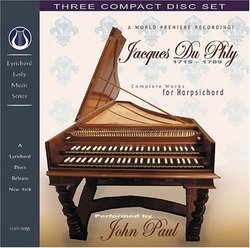A Long-Awaited Resource At Last!
Gerard Tango | 11/12/2005
(5 out of 5 stars)
"John Paul has made a career of mastering the late French baroque clavecinists, and now has produced a complete works of Jacques DuPhly truly worthy of the name. His performance style, harpsichord, and the particulars of the recording site and technology (no post processing) put this above other complete DuPhly efforts already released (on ADDA/Radio France, 1988) or pending (on Centaur). I've heard Paul live on Mississippi Public Broadcasting performing from DuPhly's Book 1, and was captivated by the momentum and yet delicacy of his playing. This is a 3CD set that any baroque/harpsichord/keyboard afficionado will want for his or her collection."
Anachronistic instrument, uninspired performance
James Mccarty | 06/21/2008
(2 out of 5 stars)
"Jacques Duphly (or DuPhly) was one of the last of the French clavecinistes, his death coinciding with the Revolution. His music is not terribly profound, but it is entertaining. The present recording is one of only a few presentations of the complete works.
Performer John Paul makes a fundamental error in his choice of instrument, a beautiful copy of the 1691 Antoine Vaudry by expert American maker Anden Houben. In the 98 years that elapsed between the birth of the original Vaudry and the death of Duphly, the sound of the French harpsichord changed rather considerably, transforming from extremely dry to overly lush. One can get by with some anachronism in one's choice of instrument when playing the French literature, but Paul's choice is too much of a stretch.
I also have stylistic objections to Paul's playing. There are too many instances where stylistic conventions such as notes inegales and Lombard rhythms are ignored, and the flexibilities of rhythm and articulation that are necessary to make the harpsichord sing are sadly lacking in too many places.
This all is unfortunate because we need more superb recordings to counter the increasingly bold encroachments of the modern pianists into the harpsichord literature. The barbarians are at the gates."
Vely Nice
Fernand Raynaud | California, USA | 06/21/2009
(5 out of 5 stars)
"On occasion you have to write a few words to counter others. Mr McCarthy's review of this recording is unfair. This is a very fine recording of important music by a good player on an excellent harpsichord. I appreciate Mr McCarthy's flagrant erudition, but the truth of the matter is that none of that really matters. John Paul is playing these pieces, whose interpretation is open to a lot of debate, as he understands them. His interpretation is sensible and it's enjoyable. If you just listen to the first track, all of Mr. McCarthy's points are put to rest. It's not true that the playing is in any way metronomic, stiff, or lacking in historically informed technique. If Mr. McCarthy would care to play us HIS interpretation, we can argue about subtleties. If anything, to my ears, the playing is sometimes a little fast and choppy, and the microphones are a little too far from the instrument to convey the intimate detail of Mr Paul's interpretation. But it's absurd to discourage purchasing this wonderful set on the basis of such issues. Many tracks, such as the final Chaconne, are unconditionally stunning. As to the instrument, it has plenty of the requisite French "bloom", even more than you would expect from a copy of an early French instrument; nobody would confuse it with a typical Flemish, Italian or German. The notion that all French harpsichords of the late 18th century sounded a certain way is likewise indefensible, and what remains is whether you like the music.
It is a music worth knowing. Duphly was a post-baroque composer, but his style does not resemble the work of, say, Haydn, not merely in being focused on the harpsichord. He continued, in the footsteps of Couperin and Rameau, the great Harpsichord tradition of 17-18th century France that ended with the Revolution (Duphly died on the day they stormed the Bastille). While adopting what to our ears is the more predictable modulation and thicker left hand accompaniment of the Classical era, his pieces retain the wonderful density and embedded melodies of the earlier harpsichordists, as well as the traditional references to other composers, in his pieces and his titles. His teachers included J.J. Rousseau (yes, THAT one), and his closest musical relative is probably Balbastre, who, in turn, had been a student of Rameau, and only survived the days of the guillotine by writing revolutionary kitsch to please the masses. I hear a foreboding sense of the tragic closing of an epoch in Duphly, the final chapter of over a century of unprecedented sophistication in music, literature, and the sciences that (perhaps) inexorably headed towards the seizure of power by little people with a propensity for simpler pleasures, such a decapitating effete aristocrats and hurling their harpsichords from balconies. When, in 1809, a hard winter led the staff at the Paris conservatory to search for firewood, they burned the remaining magnificent harpsichords that had not been vandalized by the revolutionaries, as "obsolete" (in light of the piano). Thus began the night of the harpsichord that lasted until the mid twentieth century and the Rediscovery of traditionally designed instruments and Historically Informed Performance. It is with great pleasure that I greet recordings of long forgotten masters, such as this complete edition of Duphly's harpsichord pieces. Let us not quibble -- let's rejoice and enjoy!"


 Track Listings (16) - Disc #1
Track Listings (16) - Disc #1